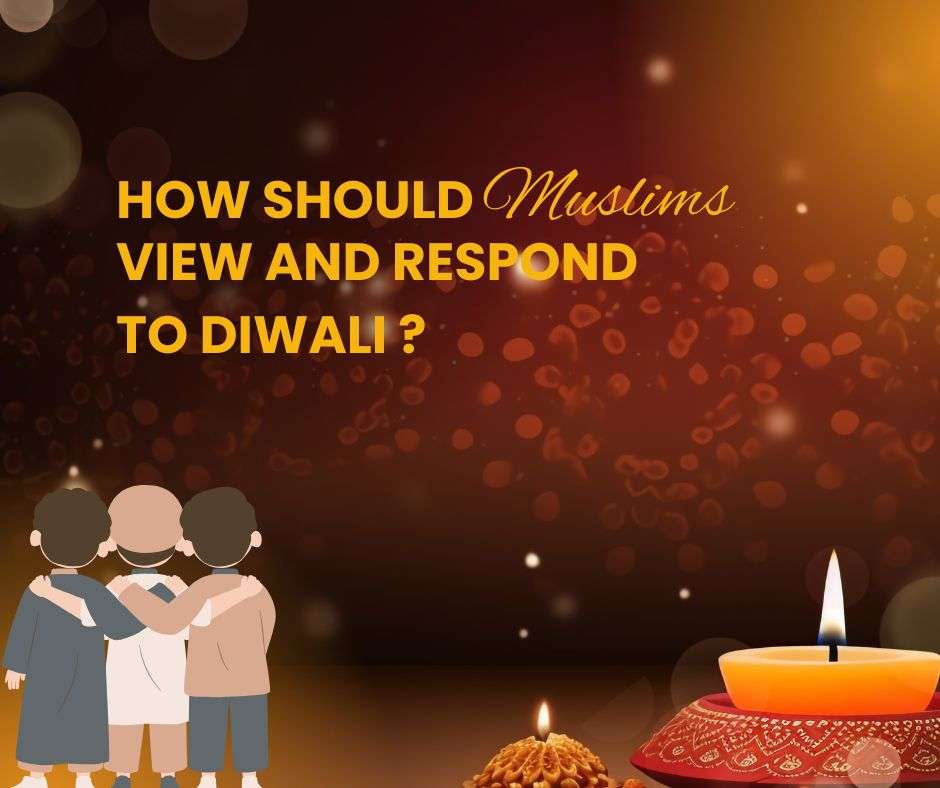
As the festival of Diwali arrives each year, streets and homes across India and many parts of the world light up beautifully. Lamps glow, fireworks burst in the sky, and people exchange sweets and good wishes. For Muslims living in such societies, this time can bring questions like: “Should we take part in Diwali?” or “How can we show kindness without joining non-Islamic rituals?”
Islam gives us clear, kind, and balanced guidance on how to live among people of different faiths while holding firmly to our own beliefs. Let’s understand what Diwali represents, and how Muslims can respond in a way that is both respectful and true to Islam.
What Is Diwali?
Diwali, or Deepavali, means “a row of lights.” It is one of the main Hindu festivals, celebrated to mark the victory of light over darkness and good over evil. Families decorate their homes with lamps (diyas), wear new clothes, exchange sweets, and offer prayers to their deities.
For Muslims, Diwali is not part of our religion, but understanding what it means helps us interact wisely and peacefully with our neighbors and friends. Islam encourages knowledge, respect, and good manners — not ignorance or hatred.
Islam’s Clear Guidance About Religious Festivals
In Islam, our beloved Prophet Muhammad ﷺ taught that Muslims have two main celebrations:
Eid al-Fitr – the festival after Ramadan, and
Eid al-Adha – the festival of sacrifice.
These are the only religious festivals prescribed for us. The Prophet ﷺ said:
“Every nation has its festival, and this is our festival.”
(Sahih al-Bukhari)
This means that while others may celebrate according to their faith, Muslims express their joy through the festivals that Allah and His Messenger ﷺ have approved. These days remind us of worship, gratitude, and obedience to Allah — not of any worldly ritual or story.
The Balance Islam Teaches
Islam is a faith of balance and wisdom. It does not tell us to disrespect others or reject kindness. Instead, it teaches us how to show good character without compromising our beliefs.
So, when Diwali comes:
We can greet our neighbors politely, wish them well for peace and safety, and even send them food that is halal — as a gesture of kindness.
But we should avoid taking part in rituals like lighting diyas for religious reasons, joining prayers to other deities, or using symbols of another faith in celebration.
This difference between respect and participation is very important. Respect builds peace. Participation in non-Islamic worship, however, goes against Tawheed (the oneness of Allah), which is the heart of Islam.
Allah reminds us in the Qur’an:
“For you is your religion, and for me is my religion.”
(Surah Al-Kafirun, 109:6)
This verse teaches peaceful coexistence — live kindly with others, but remain firm in faith.
How to Avoid Non-Islamic Rituals Respectfully
Here are a few simple ways Muslims can stay away from non-Islamic practices during Diwali while keeping harmony with others:
1. Keep Your Intention Pure
Our actions are judged by our intentions. If we’re kind and social with neighbors, our intention should be akhlaq (good manners), not celebration of their religious belief.
2. Educate Gently
If friends invite you to join Diwali rituals, you can politely explain:
“Thank you for inviting me! I respect your celebration, but as a Muslim, I don’t participate in religious rituals. May Allah bless us all with peace.”
This shows dignity and understanding.
3. Celebrate Your Own Festivals Beautifully
Show others how joyful and meaningful Eid al-Fitr and Eid al-Adha are! When you live your Islamic festivals with happiness, others see the beauty of Islam naturally.
4. Be a Source of Light — Through Faith
While others light diyas, let your heart shine with Iman. The Qur’an says:
“Allah is the Light of the heavens and the earth.”
(Surah An-Nur, 24:35)
Our real light is not from candles, but from the remembrance of Allah (dhikr), prayer, and good deeds.
A Time to Show the Best of Manners
The Prophet Muhammad ﷺ lived peacefully among people of different beliefs in Madinah. He respected their rights, greeted them kindly, and never mocked their faith — yet he never joined their worship. This is the perfect example for Muslims today.
So when Diwali comes around, let it be a time to show the character of a true believer — honest, kind, gentle, and firm upon Islam. Smile, help others, avoid argument, and let your actions speak louder than words.
Conclusion
Diwali may be a festival of light for many, but for Muslims, the true light is the light of faith and guidance from Allah. Islam teaches us to live with love and understanding, not to copy the rituals of others. By following the Qur’an and Sunnah, we keep our hearts pure and our actions pleasing to Allah.
Let’s remember: respecting others does not mean losing our own identity. Our beauty lies in living peacefully while staying loyal to our faith.
May Allah keep us firm on His path, fill our hearts with His light, and make us examples of good character in every community — Ameen.
Strengthen Your Islamic Knowledge 🌙
If you want to learn more about Islamic manners, faith, and how to live as a strong Muslim in today’s world, visit Online Islamic Institute.
They offer premium Islamic courses for all ages, designed to help you grow in knowledge and Iman in a simple, practical way.
Visit now: https://onlineislamicinstitute.org/
Wassalamu Alaikum wa Rahmatullahi wa Barakatuh 🌸
May the light of Allah always guide us to truth and peace.